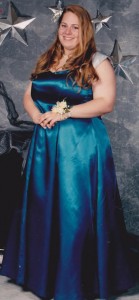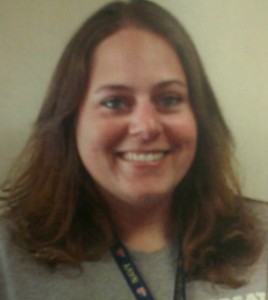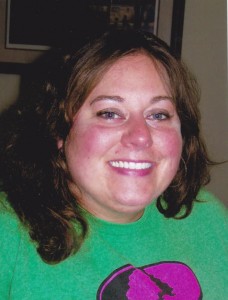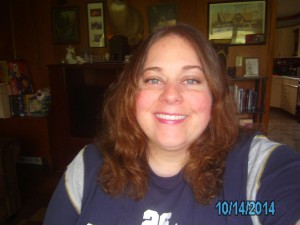Until about two years ago, Cushing’s Disease was not a part of my vocabulary; neither was cortisol, nor ACTH. Little did I know, these terms were components in the life I had probably lived for decades. Growing up, I’d always been a little bigger than the rest of the girls in my class. Yes, I’d tend to be on the chubby side from time to time, but I was not obese. I was also tall for my age. Looking back on my childhood health records, there were many years where my height and weight were proportionate. However, I always felt big and out of place. The kids at school picked on me relentlessly, making a spectacle of me and my “weight problem.” I’m surprised I didn’t suffer from depression at an earlier age. Once I hit puberty at the age of ten, things seemed to happen overnight. All of a sudden, I had breasts and a mass of underarm hair. A year later, on Thanksgiving, I had my first period. Within a few years, I began going through cycles of unintentional weight gain. I can remember feeling as though I was blowing up like a balloon, and no diet or exercise program could reverse it.
In my late teens, I remember noticing the “buffalo hump” below my neck, and thinking to myself, “I really have to work on my posture. I can’t believe I’ve got a hunched back at age 17!” By graduation in 1996, I stood 5’5″ and weighed about 215 pounds; I’d all but given up hope of weight loss. I succumbed to the fact that I was just fat and that was the way I’d always be. As long as my heart was in good condition and I didn’t develop diabetes, I’d learn to live with it.
By 2003, I’d met and married my wonderful husband. Two years later, the health issues started to rear their ugly heads. At first, it was hypothyroidism and hypertension, but by 2010 (after having my two beautiful, healthy children), I was diagnosed with high cholesterol and insulin resistance. Then there was the hiatal hernia above my stomach, acid reflux, polycystic ovarian syndrome (PCOS) and finally, a mild case of non-alcoholic fatty liver disease. The past two years have gotten progressively worse as I began experiencing severe fatigue, muscle weakness, depression, easy bruising & bleeding, a “moon face,” severe water retention (legs & stomach), acne, unwanted hair growth, acanthosis nigricans (dark patch on the back of my neck that stretched from ear lobe to ear lobe), straw-like hair, cognitive impairment, and mood swings. I also felt like there was “something” behind my right eye – it wasn’t a pain, but more like a pressure. All these changes made it feel like there was a monster living inside me.
It was in May of 2012, while doing my own research, that I discovered Cushing’s Syndrome/Disease. When I suggested it to my primary care doctor, I felt brushed off, and was referred to a local endocrinologist in Erie. I met with the endo-CRNP, explained my symptoms, and asked if I could possibly have Cushing’s. She told me that Cushing’s is rare, that I could not have it and that all my problems were a result of me not taking care of myself and from polycystic ovarian syndrome (PCOS). She also told me that PCOS can mask itself as Cushing’s, that patients with Cushing’s have central obesity and thin arms and legs but I was “fat all over” and that I do not have a buffalo hump; rather, I have poor posture. In February 2014, after a year of seeing the CRNP and never seeing the actual endocrinologist, I decided to get a second opinion. I was appalled and scared for my life after that endocrinologist laughed at me for asking about Cushing’s and then arrogantly told me, “I don’t know what to do for you.”
Finally, I made an appointment at the Cleveland Clinic. I was sick and tired of the doctors in my area not producing answers for me and wondering how I could possibly have so many things wrong with me at such a young age. A couple weeks prior to my Cleveland visit, I tripped going up the steps in the garage and landed on my right shin. I immediately started to bruise, and within 24 hours, my leg, ankle, and foot were all the colors of the rainbow! At the local emergency room, ultrasounds and clotting panels came back normal, and x-rays of my leg did not detect a fracture or break.
On March 31, 2014, I saw my Cleveland endocrinologist, Dr. Leila Khan. My leg certainly sent up warning signals and she was shocked to see that my DHEA-s and testosterone levels were so high. She was also adamant that we begin testing for Cushing’s after seeing that my ACTH and a.m. cortisol levels in the past were elevated. After the results from the extensive blood, salivary, urine, and suppression tests used to diagnose Cushing’s came back abnormal, Dr. Khan was confident that my pituitary gland that was the culprit. I was also asked to participate in a study of cyclic Cushing’s where I submitted saliva samples over a period of six weeks. Of course I was happy and honored to do so – anything to help doctors uncover the mysteries of this debilitating disease!
On May 30th, I had my pituitary MRI. On June 1st, Dr. Khan called to give me the “best” news I’ve had in years – there was a 5x4x3mm tumor on my pituitary gland that was touching my right optic nerve, but not compressing it. She then told me that I was right about suspecting this disease two years ago. What a nice thing to hear instead of, “You’re crazy! You don’t know what you’re talking about! Eat less and exercise more!” I can remember calling my husband to tell him the news and saying, “See?? I told you it was all in my head!!” It was overwhelming to know that I wasn’t crazy and really was sick; not just fabricating things in my mind.
Within a week, I met my neurosurgeon (Dr. Pablo Recinos) and my ENT doctor (Dr. Troy Woodard), as well as their nurses and fellows who would be assisting them during my operation. My transsphenoidal surgery was scheduled for Monday, August 18, 2014. It seemed so far away, and I had to occupy my thoughts with happy things like listening to my beautiful kids laughing and playing in the summer sun and fishing with my husband. My husband has been so supportive and patient with me; he took care of so many things for me and distracted my mind as best as he could. I really don’t know that I would have made it without him. Work was another thing that kept my mind busy, but the last few weeks were rough. I’m a dental assistant instructor and I struggled to find the right words during lecture. My eyes weren’t focusing right, either; they felt like they were “bouncing.”
Finally the big day arrived. I’ll never forget my trip from the prep-room to the operating room. A nurse – a tall, thin, vibrant young man – grabbed hold of my gurney and literally ran me to my destination! It was so much fun! I smiled the whole way to the operating room and can remember thinking what an incredible journey I’d been on; with periods of wonder, worry, anger, sadness, fear, and hopelessness. Dr. Recinos explained what they’d be doing and how my cortisol levels post-op would determine if the surgery was a success. My husband later told me that, after the operation, Dr. Recinos said that nothing would make him happier than to see my cortisol levels plummet and have me get really sick the next day. Dr. Recinos got his wish – my cortisol levels dropped to zero and boy was I miserable!
I was able to go home by Thursday with my new medicine regimen of hydrocortisone. By the weekend, I was feeling pretty lousy and did a lot of sleeping. When I woke up from a nap on Sunday, I noticed I had double vision. That week, I had a post-op appointment to have the surgical packing removed (via my nose – NOT fun!). My doctors evaluated me and determined that I had a 6th nerve palsy due to swelling at the surgical site that would clear up with a prednisone taper.
As I was coming off the prednisone taper and getting ready to start my hydrocortisone taper, I began to experience joint and muscle pain. I tried going back to work at the end of September, but I only lasted a week. I’m very frustrated with my energy level. I feel the need to get up and move, but there are days when I just can’t. Some days, the only relief I can get is to lie down, as it hurts to sit or stand. I have to tell myself that it’s ok to take a nap or to go back to bed for another hour after the kids get on the bus. Pushing myself to do more than I am physically capable of won’t speed up the healing process.
I haven’t lost much weight – maybe 10 pounds – but I was told weight loss would be easier to achieve once I am off the steroids. My doctors and family say I look thinner and that my appearance has changed. I’ve also noticed a tremendous difference in my appetite – it’s pretty much non-existent! Some days I can’t stand the thought, sight, or smell of food and have to force myself to eat.
While recovery hasn’t been easy, my 6th nerve palsy cleared up, the easy bruising has gone away, the ancanthosis nigricans is gone, and my buffalo hump has gotten smaller. I am no longer on blood pressure meds, the acne and unwanted hair growth is subsiding, and my concentration level has improved. Even my hair feels and looks much better.
Yes, Cushing’s Disease is rare, but obviously, people do get it. I’ve often compared Cushing’s Disease to the aftermath of a tornado. You see images of all that chaos and destruction; you feel the hopelessness and helplessness that the victims must be feeling; and you think, “Oh my gosh, how in the world are they ever going to pick up and get back to living a normal life after all that destruction?” That’s what living with Cushing’s Disease is like. People that don’t understand how it feels, may think that us Cushies are making things up or blowing things out of proportion. No – we’re not. Cushing’s Disease is a very real thing.
I was happy to join CSRF and receive the last four newsletters. Reading the patient stories was helpful to me. We are all different, but so very similar; kind of like snowflakes – each one unique. I hope and pray that Cushing’s awareness becomes more prominent, especially among the medical profession. It seems we, as the patients, are the ones doing the research and self-diagnosing. A good endocrinologist with knowledge of Cushing’s and other rare endocrine diseases is hard to find. I’m blessed to have found one!
My thoughts and prayers are with all of those who are suffering from, recovering from, and still fighting with this wretched disease. I will be forever grateful to Dr. Khan, Dr. Recinos, and Dr. Woodard and their nurses/staff at Cleveland Clinic for listening to and taking care of me! May God bless all of you!
Member: 142605
Newsletter: Winter, 2014
State: Pennsylvania










Sorry, comments are closed for this post.